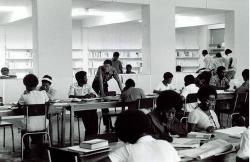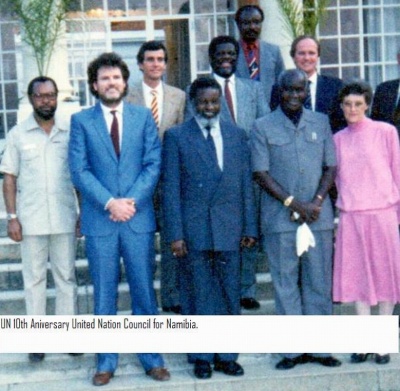Difference between revisions of "United Nations Institute for Namibia"
(template) |
(Update) |
||
| (2 intermediate revisions by the same user not shown) | |||
| Line 1: | Line 1: | ||
{{group | {{group | ||
|wikipedia=https://en.wikipedia.org/wiki/United_Nations_Institute_for_Namibia | |wikipedia=https://en.wikipedia.org/wiki/United_Nations_Institute_for_Namibia | ||
| + | |image=UNIN_library.jpg | ||
| + | |description=Namibian students in the library of the United Nations Institute for Namibia in 1978 | ||
|start=1976 | |start=1976 | ||
|end=1990 | |end=1990 | ||
|interests=Namibia | |interests=Namibia | ||
}} | }} | ||
| − | The '''United Nations Institute for Namibia''' ([[UNIN]]) was an educational body set up by the [[United Nations Council for Namibia]] from 1976-1990. | + | The '''United Nations Institute for Namibia''' ([[UNIN]]) was an educational body set up by the [[United Nations Council for Namibia]] from 1976-1990. |
| + | |||
| + | Based in Zambia's capital of Lusaka, UNIN was the brainchild of [[United Nations Commissioner for Namibia]] [[Seán MacBride]] whose proposal creating UNIN was adopted by the [[United Nations General Assembly]] in December 1974.<ref>[http://www.jstor.org/stable/160803?seq=1 "A Future 'University of Namibia'?: The Role of the United Nations Institute for Namibia"], by Christian M. Rogerson, 1980, Cambridge University Press</ref> | ||
| + | |||
| + | The forerunner to the current University of Namibia, UNIN sought to educate Namibians for roles in an independent Republic of Namibia. | ||
==Background== | ==Background== | ||
| Line 13: | Line 19: | ||
Funding for UNIN was provided for, on a short term basis, by the United Nations Fund for Namibia, itself funded by individual government donations and private organisations such as the Ford Foundation. | Funding for UNIN was provided for, on a short term basis, by the United Nations Fund for Namibia, itself funded by individual government donations and private organisations such as the Ford Foundation. | ||
| − | == | + | ==Closing down== |
| − | + | Having closed in September 1990 – 6 months after Namibia's independence was achieved – UNIN's files were transferred to the archival unit at the University of Namibia.<ref>[http://library.unam.na/libr-archives.html "Archives of the University of Namibia"]</ref> | |
| + | |||
| + | Extract from [[UN General Assembly]] Resolution 44/243 of 12 September 1990: | ||
| + | :7. Decides that the United Nations Institute for Namibia, having fulfilled its mandate to provide substantive support in its areas of competence in the struggle for freedom of the Namibians and the establishment of an independent Namibia and in view of the critical financial difficulties which it is experiencing, shall cease its operations on 30 September 1990; | ||
| + | |||
| + | :8. Requests the [[UN Secretary-General]], in consultation with the United Nations Trust Committee for the United Nations Fund for Namibia, and in co-operation with the Governments of Namibia and Zambia, to implement the closure of the United Nations Institute for Namibia as provided for in paragraph 7 above, and to liquidate its assets and discharge its liabilities and, having regard to the needs of Namibia and the successor institution to the Institute, to make available any residual net assets for utilisation by such successor institution; | ||
| + | |||
| + | :9. Expresses its deep appreciation to the Government of Zambia for accommodating the United Nations Institute for Namibia prior to Namibia's independence and extending services, courtesies and privileges to facilitate the Institute's operations in Zambia;<ref>[http://www.un.org/documents/ga/res/44/a44r243.htm "Dissolution of the United Nations Council for Namibia"] Resolution 44/243 of the United Nations</ref> | ||
| − | ==Notable | + | ==Notable UNIN affiliates== |
| + | [[File:UNIN_X.jpg|400px|right|thumb|[[UNIN]]'s 10th anniversary: Namibians [[Hidipo Hamutenya]], [[Anton Lubowski]], [[Charles Courtney-Clarke]], [[Sam Nujoma]] and [[Hage Geingob]] with Zambian President [[Kenneth Kaunda]] ]] | ||
* Hugh Africa, Instructor at the Institute; South African academic<ref>[http://www.whoswhosa.co.za/Pages/profilefull.aspx?IndID=5452" Professor Hugh Africa"] Who's Who in Southern Africa</ref> | * Hugh Africa, Instructor at the Institute; South African academic<ref>[http://www.whoswhosa.co.za/Pages/profilefull.aspx?IndID=5452" Professor Hugh Africa"] Who's Who in Southern Africa</ref> | ||
* [[Martti Ahtisaari]], member of the Senate of UNIN from 1975 to 1976;<ref>[http://www.clubmadrid.org/cmadrid/index.php?id=399 "Biography of Martti Ahtisaari"] Club of Madrid</ref> Finnish politician and diplomat | * [[Martti Ahtisaari]], member of the Senate of UNIN from 1975 to 1976;<ref>[http://www.clubmadrid.org/cmadrid/index.php?id=399 "Biography of Martti Ahtisaari"] Club of Madrid</ref> Finnish politician and diplomat | ||
Latest revision as of 16:50, 25 October 2016
 | |
| Formation | 1976 |
| Extinction | 1990 |
| Parent organization | UN |
| Interests | Namibia |
| Namibian students in the library of the United Nations Institute for Namibia in 1978 | |
The United Nations Institute for Namibia (UNIN) was an educational body set up by the United Nations Council for Namibia from 1976-1990.
Based in Zambia's capital of Lusaka, UNIN was the brainchild of United Nations Commissioner for Namibia Seán MacBride whose proposal creating UNIN was adopted by the United Nations General Assembly in December 1974.[1]
The forerunner to the current University of Namibia, UNIN sought to educate Namibians for roles in an independent Republic of Namibia.
Background
As states across Africa achieved independence, Namibia remained illegally ruled by apartheid South Africa. Treated as a fifth province, Namibia did not have its own tertiary educational system. Bantu Education, or purposely inferior education for black Namibians, was the norm. The UN Council for Namibia under Seán MacBride put forward a plan in February 1974 for a tertiary educational institution for Namibia in Africa, preferably Zambia. On 26 August 1976 (Namibian Heroes' Day), President of Zambia Kenneth Kaunda formally inaugurated the institute in Lusaka.
Funding
Funding for UNIN was provided for, on a short term basis, by the United Nations Fund for Namibia, itself funded by individual government donations and private organisations such as the Ford Foundation.
Closing down
Having closed in September 1990 – 6 months after Namibia's independence was achieved – UNIN's files were transferred to the archival unit at the University of Namibia.[2]
Extract from UN General Assembly Resolution 44/243 of 12 September 1990:
- 7. Decides that the United Nations Institute for Namibia, having fulfilled its mandate to provide substantive support in its areas of competence in the struggle for freedom of the Namibians and the establishment of an independent Namibia and in view of the critical financial difficulties which it is experiencing, shall cease its operations on 30 September 1990;
- 8. Requests the UN Secretary-General, in consultation with the United Nations Trust Committee for the United Nations Fund for Namibia, and in co-operation with the Governments of Namibia and Zambia, to implement the closure of the United Nations Institute for Namibia as provided for in paragraph 7 above, and to liquidate its assets and discharge its liabilities and, having regard to the needs of Namibia and the successor institution to the Institute, to make available any residual net assets for utilisation by such successor institution;
- 9. Expresses its deep appreciation to the Government of Zambia for accommodating the United Nations Institute for Namibia prior to Namibia's independence and extending services, courtesies and privileges to facilitate the Institute's operations in Zambia;[3]
Notable UNIN affiliates

- Hugh Africa, Instructor at the Institute; South African academic[4]
- Martti Ahtisaari, member of the Senate of UNIN from 1975 to 1976;[5] Finnish politician and diplomat
- Hage Geingob, Founding director from 1975–89, as of 2015 President of Namibia
- Petrus Damaseb, High Court Judge, CAF and FIFA official
- Kalla Gertze, student and future Congress of Democrats MP
- Tsudao Gurirab, earned diploma in Management and Development Studies in 1982, future Congress of Democrats MP
- Hidipo Hamutenya, founding member, Deputy Director and Head of the History and Political Science Department from 1976 to 1981; founding member of opposition party Rally for Democracy and Progress (RDP)
- Albert Kawana, earned diploma in Management and Development Studies in 1979, future SWAPO MP and prominent cabinet member beginning in 2000
- Nangula Mbako, obtained a Diploma in Development Studies and Management in 1986; Permanent Secretary in the Ministry of Fisheries and Marine Resources of Namibia since April 2000[6]
- Ngarikutuke Tjiriange, assistant professor from 1977–82; Minister for Veteran's Affairs of Namibia
- Abdelrahim Elshayeb, social science lecturer at the educational department from 1984 to 1990. Mr Elshayeb was assigned to the institute by the Egyptian government.
- Inge Zaamwani, 1981 graduate in development studies, managing director of Namdeb mining venture since 1999.[7]
References
- ↑ "A Future 'University of Namibia'?: The Role of the United Nations Institute for Namibia", by Christian M. Rogerson, 1980, Cambridge University Press
- ↑ "Archives of the University of Namibia"
- ↑ "Dissolution of the United Nations Council for Namibia" Resolution 44/243 of the United Nations
- ↑ " Professor Hugh Africa" Who's Who in Southern Africa
- ↑ "Biography of Martti Ahtisaari" Club of Madrid
- ↑ "Biography of Nangula Mbako" Jacques Malan Consultants & Actuaries
- ↑ "Inge Zaamwani" at the Namibia Institute for Democracy
Wikipedia is not affiliated with Wikispooks. Original page source here